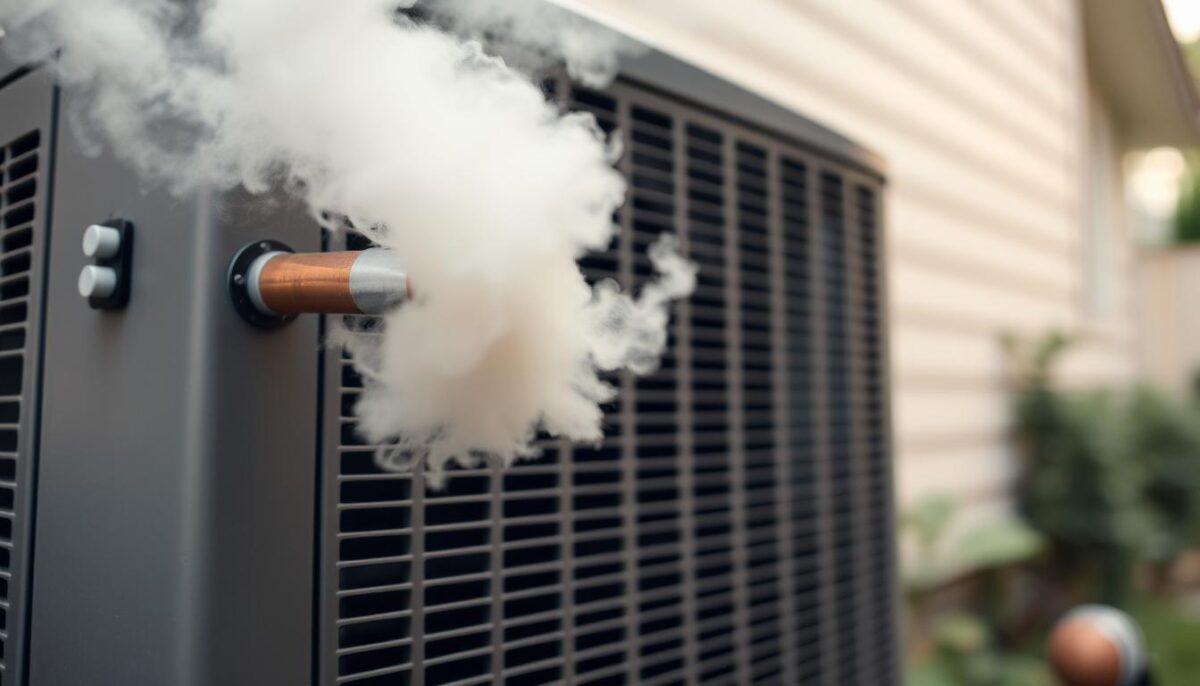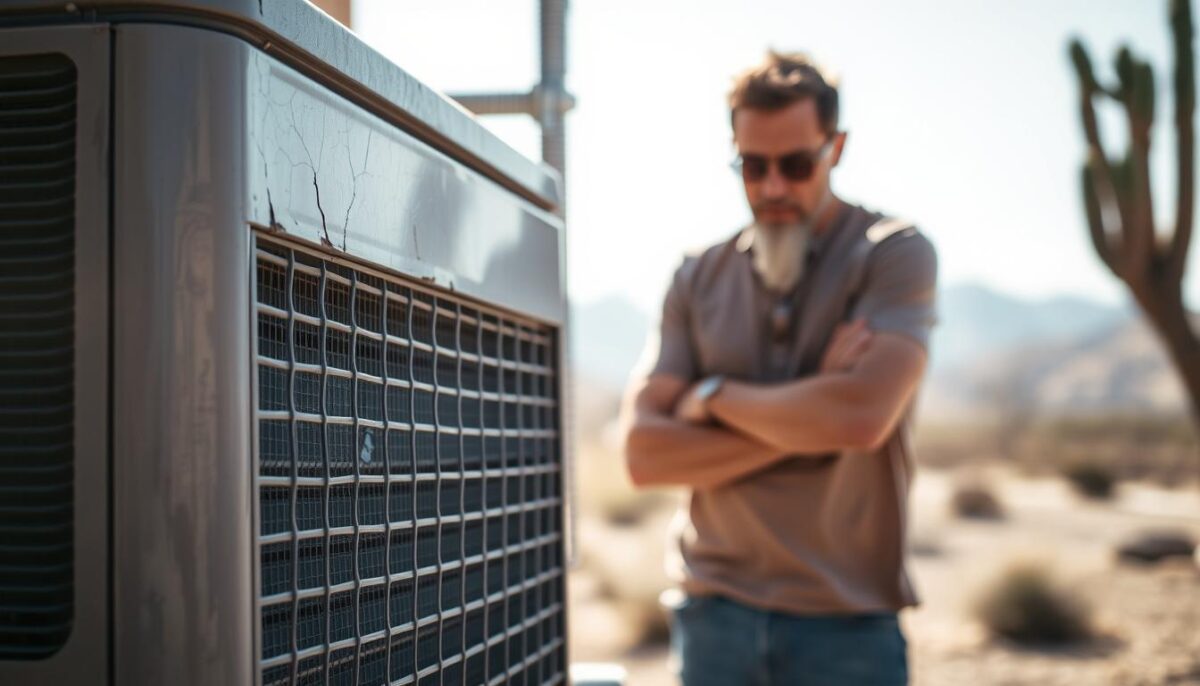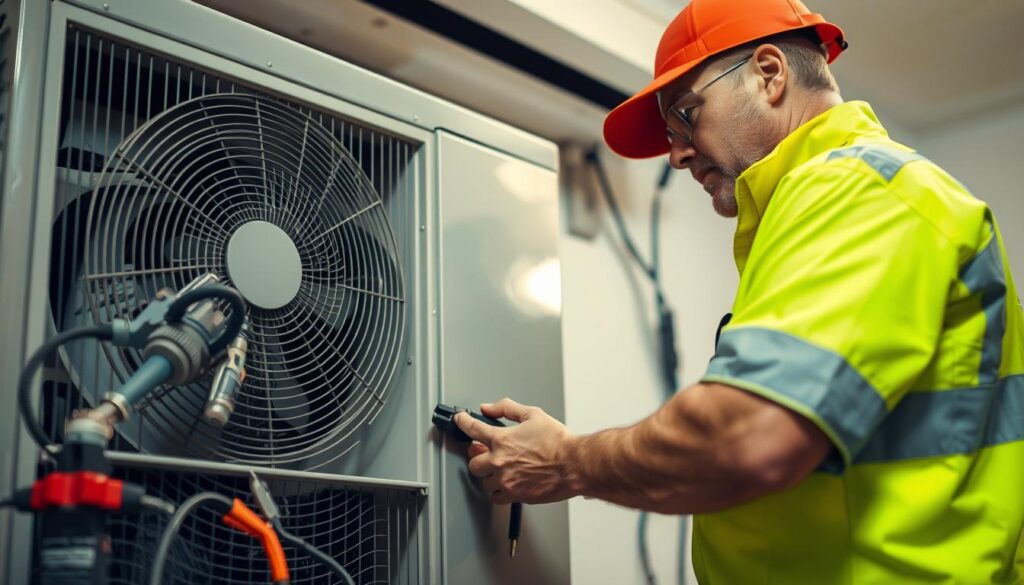AC Refrigerant Leaks: Symptoms, Dangers & Repair Guide
Air conditioning systems are crucial for maintaining a comfortable indoor environment, especially during the hot summer months. However, when these systems develop an AC refrigerant leak, it can lead to reduced cooling efficiency and potential health risks.
The air conditioning system relies on refrigerant to absorb heat from indoor air and produce cool air. A leak in the system not only compromises its performance but also poses health hazards due to the release of refrigerants like Freon.
Understanding the symptoms of a refrigerant leak is crucial for early detection and preventing more serious damage to your system. This comprehensive guide will walk you through the signs, dangers, and repair options for refrigerant leaks.
Key Takeaways
- Refrigerant leaks can reduce cooling efficiency and increase energy bills.
- Exposure to refrigerants like Freon can cause health issues.
- Early detection of refrigerant leaks is crucial for preventing system damage.
- Understanding the causes and symptoms of refrigerant leaks can help in making informed repair decisions.
- Repair or replacement options depend on the severity of the leak and system condition.
Understanding AC Refrigerant and Its Function

To comprehend the significance of refrigerant leaks, it’s essential to understand what refrigerant is and how it functions within your air conditioning system. The refrigerant is a chemical compound that circulates through the air conditioning system, facilitating the cooling process.
What Is Refrigerant and How Does It Work?
Refrigerant is the lifeblood of your air conditioning system, functioning as a heat transfer medium that absorbs heat from inside your home and releases it outdoors. It works through a process of compression and expansion – when compressed, it heats up, and when allowed to expand, it cools down dramatically. For more detailed information on how refrigerant works, you can visit Understanding A/C Refrigerant.
- Refrigerant isn’t consumed during normal operation but continuously cycles through your system in a closed loop, changing from liquid to gas and back again.
- The process involves the compressor, condenser, and evaporator coils, working together to cool your home.
Types of Refrigerants: From Freon to Modern Alternatives
Older AC systems typically used R-22 (Freon), which has been phased out due to its harmful environmental effects, particularly its contribution to ozone depletion. Modern air conditioners use more environmentally friendly alternatives like R-410A (Puron), which offers better energy efficiency and doesn’t contribute to ozone depletion.
- Understanding the type of refrigerant your system uses is crucial when dealing with potential leaks.
- Different refrigerants require different handling procedures and replacement options.
By understanding the role of refrigerant and the differences between older and newer types, homeowners can better appreciate the importance of maintaining their air conditioning systems and addressing any issues related to refrigerant leaks promptly.
Common Causes of AC Refrigerant Leaks
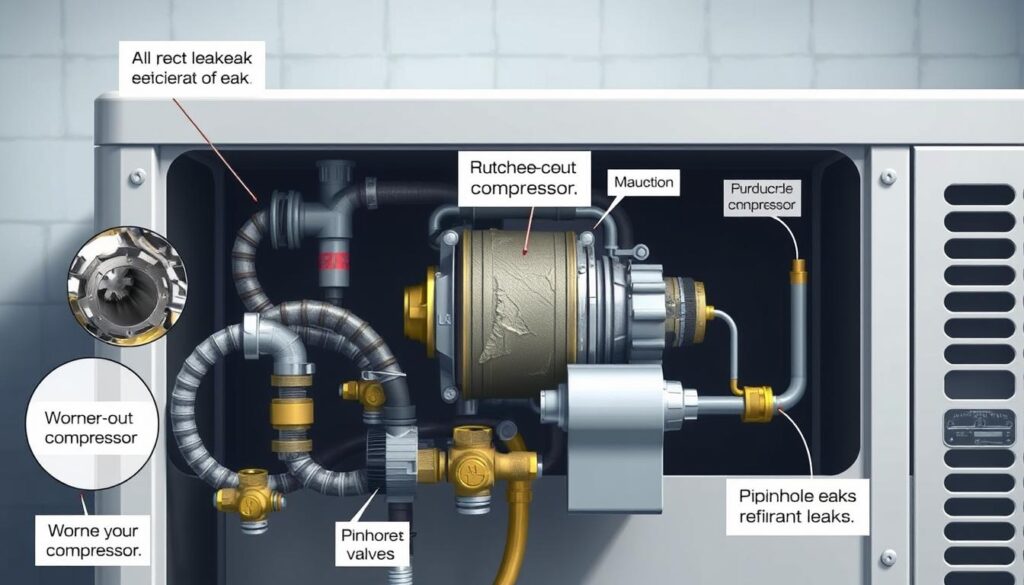
Understanding the common causes of AC refrigerant leaks is crucial for maintaining your HVAC system’s efficiency. Air conditioning systems are designed to be sealed, but over time, various factors can compromise this sealed environment and lead to refrigerant leaks.
Natural Wear and Tear on Components
Natural wear and tear is one of the most common causes of refrigerant leaks. The constant vibration, pressure changes, and temperature fluctuations gradually weaken components like copper tubing and connection points in the AC unit. As the air conditioning system ages, these components can become more susceptible to damage.
Corrosion and Environmental Factors
Corrosion is particularly problematic in coastal areas or environments with high pollution levels. Formicary corrosion, also known as ant’s nest corrosion, can create microscopic tunnels in copper components that allow refrigerant to escape. This type of corrosion affects the metal components, including copper tube walls found inside the indoor coil of the air conditioners.
Poor Installation and Factory Defects
Poor installation practices often lead to premature leaks, especially when connections aren’t properly tightened, tubes are bent too sharply, or the system isn’t properly evacuated before charging with refrigerant. Additionally, factory defects, though less common, can include improperly soldered joints or defective valves that may not manifest until the system has been operating for some time.
Recognizing the Signs of an AC Refrigerant Leak
A refrigerant leak can significantly impact your AC’s performance, and recognizing the signs early is crucial for effective repair. Your air conditioning system is designed to provide a comfortable indoor climate, but when refrigerant leaks occur, it can lead to a range of issues that affect both the system’s efficiency and your overall comfort.
Decreased Cooling Performance
One of the primary indicators of a refrigerant leak is a decrease in your AC’s cooling performance. If your unit is running constantly but struggling to reach the desired temperature, it may be a sign that refrigerant levels are low. This reduced cooling efficiency not only affects your comfort but also puts additional strain on the system.
Unusual Sounds and Odors
Unusual sounds, such as hissing or bubbling noises coming from your AC unit, can indicate a refrigerant leak. These sounds are often a result of refrigerant escaping from the system. Additionally, some leaks may produce sweet or chemical odors, although this is not always the case.
Ice Formation on Evaporator Coils
Ice formation on the evaporator coils or refrigerant lines is a clear sign of a refrigerant issue. When refrigerant levels drop, the coils can become abnormally cold, causing condensation to freeze. This can lead to further complications if not addressed promptly.
Rising Energy Bills and Humidity Levels
A refrigerant leak can also lead to increased energy bills and higher humidity levels indoors. As the system works harder to achieve the desired cooling effect, it consumes more electricity. Moreover, with reduced refrigerant, the system’s ability to remove humidity from the air diminishes, leading to a clammy, uncomfortable indoor environment.
| Signs of Refrigerant Leak | Description |
|---|---|
| Decreased Cooling Performance | AC runs constantly but fails to reach the set temperature. |
| Unusual Sounds | Hissing or bubbling noises from the AC unit. |
| Ice Formation | Ice on evaporator coils or refrigerant lines. |
| Increased Energy Bills | Higher electricity consumption due to the system working harder. |
| High Humidity Levels | Reduced ability to remove humidity from the indoor air. |
How to Detect an AC Refrigerant Leak
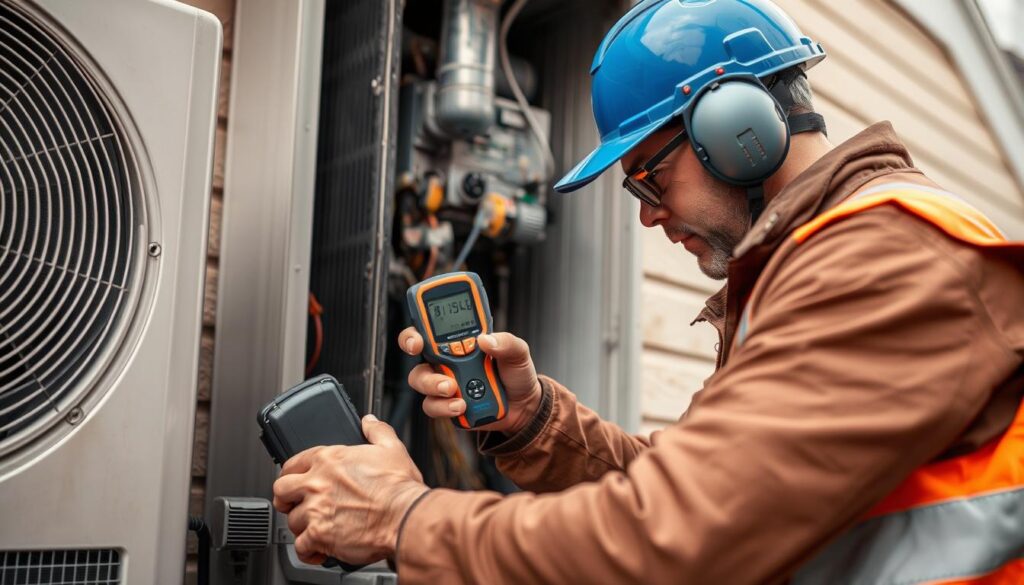
Identifying a refrigerant leak in your AC system can be challenging, but there are several methods to help you detect the issue. Refrigerant leaks can lead to decreased cooling performance, increased energy bills, and potentially harm the environment.
Visual Inspection Methods
A visual inspection is the first step in detecting a refrigerant leak. Look for oil stains around connections, as refrigerant oil often escapes alongside the refrigerant and leaves telltale residue. Inspect the refrigerant line, coil, and other components for signs of leakage or damage.
Bubble Test Using Soapy Water
The bubble test is a simple DIY method for detecting leaks. Apply a soapy water solution to the suspected leak areas and watch for bubbles that form as refrigerant escapes. Focus on connections, valves, and visible portions of the refrigerant line.
Electronic Leak Detectors and UV Dye Testing
For more accurate detection, consider using an electronic leak detector or UV dye testing. Electronic leak detectors can sense the presence of refrigerant in the air, while UV dye testing involves adding a fluorescent dye to the refrigerant system and using a UV light to locate the leak.
When to Call a Professional Technician
If you’re unsure about how to detect a refrigerant leak or if the leak persists after attempting to fix it, it’s time to call a professional HVAC technician. They have the necessary tools and expertise to diagnose and repair refrigerant leaks safely and effectively.
Health and Environmental Dangers of Refrigerant Leaks
The leakage of refrigerant from air conditioning systems poses significant risks to both human health and the environment. Refrigerant leaks can lead to a range of problems, from health issues due to exposure to the leaked refrigerant to environmental damage caused by the release of harmful substances into the atmosphere.
Health Risks from Refrigerant Exposure
Exposure to refrigerant leaks can cause various health problems. Inhaling refrigerant can lead to symptoms such as dizziness, shortness of breath, and loss of coordination. Direct contact with the coolant can cause allergic reactions, frostbite, or chemical burns. According to the CDC, high concentrations of refrigerants like Freon can cause headaches, dizziness, and irregular heartbeat.
Households with vulnerable members, such as young children, the elderly, or individuals with respiratory conditions, should be particularly cautious about refrigerant leaks, as these groups are more susceptible to health effects.
Environmental Impact of Refrigerant Emissions
Refrigerant emissions have a significant environmental impact. Older refrigerants, such as R-22 (Freon), contain chlorofluorocarbons (CFCs) that deplete the ozone layer. Even newer refrigerants like R-410A have a high global warming potential (GWP), contributing to climate change. The table below summarizes the environmental impact of different refrigerants:
| Refrigerant Type | Ozone Depletion Potential | Global Warming Potential |
|---|---|---|
| R-22 (Freon) | High | High |
| R-410A | Low | High |
| R-32 | Low | Moderate |
The environmental impact of refrigerant leaks has led to strict regulations regarding handling, recovery, and disposal. Proper management of refrigerants is crucial to mitigate their harmful effects on the environment.
Repair or Replace: Making the Right Decision for Your AC System
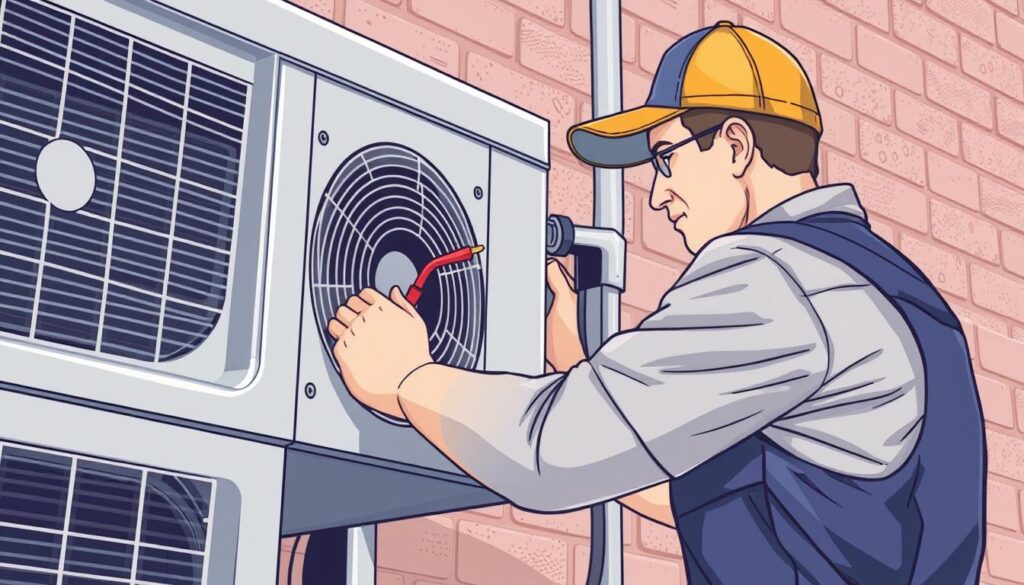
A refrigerant leak in your AC system raises a critical question: should you opt for repairs or invest in a new unit? This decision hinges on several factors, including the age of your air conditioner, the extent and location of the leak, and the type of refrigerant used.
The age of your air conditioner is a primary consideration. If your unit is over 10-15 years old, investing in repairs for a freon leak may not be cost-effective, especially considering the limited remaining lifespan of the system.
For systems using R-22 refrigerant (Freon), replacement is often the more economical choice since this refrigerant has been phased out as of 2020, making it increasingly expensive and difficult to obtain. If your AC is an older unit that uses the R-22 refrigerant, you should be aware that the U.S. government has imposed an order to phase out this compound beginning January 2020.
A good rule of thumb is the “50% rule” – if repair costs exceed 50% of the cost of a new unit, replacement is typically the better investment. Modern air conditioners offer significant advantages in energy efficiency, often reducing cooling costs by 20-40% compared to older models.
Consulting with multiple professional HVAC technicians can provide valuable perspectives on whether repair or replacement makes more sense for your specific situation. If you decide to repair, ensure the technician identifies and fixes the root cause of the refrigerant leak, not just recharging the coolant.

